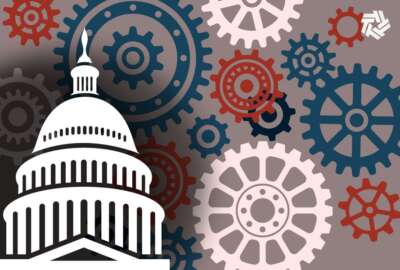Understatement: Congress doesn’t function properly
Survey of congressional staff shows worrisome trends in how the crucial staff feels about their jobs, their working conditions, and the behavior of Members.
Think it’s tough in your agency? Imagine a workplace where almost no one thinks the agency functions properly. Where large numbers of people don’t feel physically safe. Where the top leadership are so nasty to one another, half the senior staff consider skedaddling.
That, as you might have guessed, constitues the status of work life for staff members of the Congress of the United States. This finding comes from the Congressional Management Foundation, which surveyed 138 senior staff members. Only 5 percent of the people surveyed answered, but the foundation’s president, Brad Fitch, said the results show clear trends; principally, that the staff of the Congress labors under a peculiar group of people.
I”ll spare you yet another take on the principal issues impeding the car wreck that is Congress. Congressional staff occupy a galaxy less visible to the public, and even to much of the executive branch bureaucracy. Even in my own 32 years of covering government, I’ve spoken to only a handful congressional staff members, fewer even than members themselves. Staff learn early the value of self-attenuation in the shadows of their often egotistical bosses.
But don’t think they’re diffident. In fact, traipsing through the brick tunnels of the Capitol complex are some of the most informed and practically-minded people you’ll find anywere. Name the issue, and you can find members of the congressional staff that possess expert knowledge. And since politics often has the surface grace of ballet but the tactics of a prison yard, staff of one party sometimes know better than their members how to devise compromises with those of the opposite party.
When first-elected members come to town with perhaps green personal staffs, you can bet they learn lot from the committee staffs.
I say this only because the staffs of members of Congress constitute a sometimes underappreciated contributor to the nation’s well-being. If the Congress itself is semi-functional, the blame goes to many factors. Staff isn’t one of them. So it’s good to see at least a sampling survey of the health of this workforce. By contrast, the executive branch workforce is the object of intense, detailed and never-ending study. The annual Federal Employee Viewpoint Survey provides rich data and insight.
Here is a bit of what the Foundation survey found:
- Only 19% of the staff members thinks Congress “correctly functions as a democratic legislature should.” That breaks down to 31% of Republican respondents, 12% of Democratic.
- Only 20% agree that Congress provides “an effective forum” for debating the important questions.
- 81% of Republicans and long serving staff members tend to disagree that “current procedures” give members of Congress the information they need from the executive branch to do their congressional duties. Sure, there’s a Democratic administration. But 46% of Democrats also find information from the executive branch wanting.
- Two thirds of Democratic and Republican staff members would like elected leadership to “enforce the rules and norms of civility and decorum in Congress.” At least they don’t march into the chambers and whack one another with canes.
I spoke with Brad Fitch, the president of the foundation that surveyed congressional staff. A longtime watcher of Congress, Fitch said he doesn’t think the acrimony among members seeps down into staff relations. Otherwise, literally no bill might get written, much less ones the members reject anyway.
Fitch said — and the survey shows this — that the congressional staff sees positive movement in the technology, the workplace tools that have arrived in recent years. The Select Committee on the Modernization of Congress helped here. It sunsetted last year, but now there’s a follow-on caucus. Rep. Derek Kilmer (D-Washington) ably chaired the remarkably bipartisan committee. It came up with a couple of hundred recommendations, a couple of dozen of which Congress implemented. Senior staff are better paid now, and they have somewhat better IT systems.
It seems bizarre that an institution as important as the United States Congress engenders agreement about its own brokenness among its own members, the citizenry, historians and just about everyone else. Just don’t blame the staff.
Copyright © 2025 Federal News Network. All rights reserved. This website is not intended for users located within the European Economic Area.
Tom Temin is host of the Federal Drive and has been providing insight on federal technology and management issues for more than 30 years.
Follow @tteminWFED






